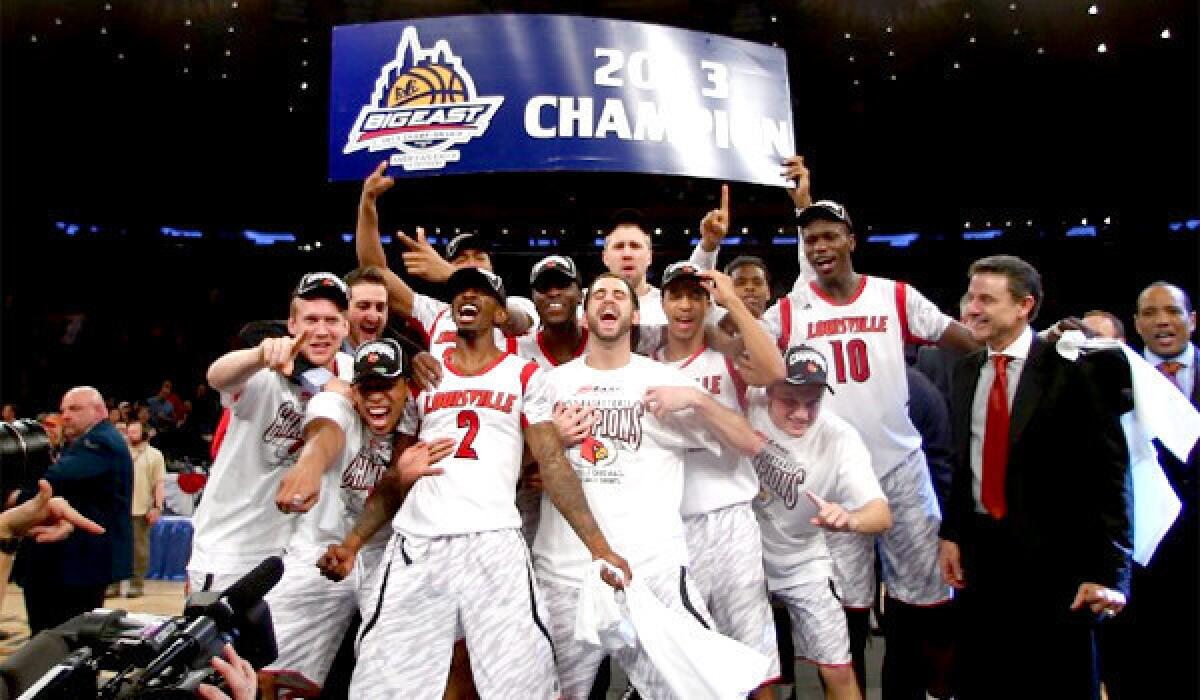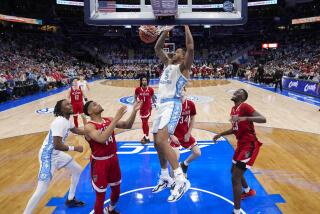There’s no Cinderella, and other keys to picking bracket winners

- Share via
I know the look. For the last three decades, every year at this time, I get the look.
A friend or family member will slowly approach with a piece of wrinkled paper, a chewed-off pencil and a wistful stare. It’s always someone who doesn’t follow sports. It’s often someone who doesn’t know whether a basketball is inflated or stuffed.
I know the look. I call it Bracket Eyes.
“Hey, can you help me with my pool?”
It is a question about the NCAA basketball tournament, otherwise known as This Country’s Biggest Sports Event for People Who Don’t Like Sports. Everyone joins an office pool the way everyone brings a gift for the office Christmas party — everyone wants to feel part of the group, but nobody wants to be embarrassed.
That’s where I come in. I’m a sucker for Bracket Eyes. When else do acquaintances or co-workers suddenly find me the object of desire? When else do non-sports fans even know I exist? So I will politely stand over their shoulders and quietly give my predictions while they fill in their brackets. I soak in my fame for the fleeting few seconds that it takes to pronounce, “There’s no way VCU gets past Michigan!”
In the past, it turned out that Bracket Eyes were the real suckers. My predictions would usually get them through the first weekend, but by the second Sunday their brackets looked like heavily corrected ninth-grade essays. And by the Final Four weekend I was interrupting their complaints with vaunted predictions about the baseball season.
However, much like the red hair on that kid who plays from Wisconsin, my fortunes have wildly grown. I whittled all my collective embarrassments into a set of general rules, I began following those rules with my head instead of heart and last season I finally had my one shining moment.
I correctly picked the Final Four, the final two, the champion, and mostly every other game. I won every bracket I entered and it wasn’t even close. I even finished in the top 100 percentile of that giant ESPN bracket thingy, and I’m not sure how that works, but I think I beat about a million people senseless.
I was hot. I will never be that hot again. I will never be able to write this kind of column with such authority again.
So, Bracket Eyes, once and forever, here are those rules.
1. There is no such thing as Cinderella.
This tournament is sold on the notion that anyone can win. It’s false advertising. Teams with low seedings from obscure conferences cannot win more than one game. They are fun, but they are fool’s gold. For every Lehigh or Norfolk State, there are dozens of small schools that are blown out by the first half of the first game.
March Madness is a myth. The tournament is about March Greatness. The real madness this year is in picking a team like Davidson or Iona or South Dakota State. Don’t do it. Only one team seeded 12th or lower has ever even won a Sweet 16 game. And, no, rich and established Butler is not a Cinderella.
2. Go Goliath.
If you’ve already filled out your bracket, go back and check your Final Four. Add up the numbers of the four seeded teams. Only six times in the last 26 years have those numbers been greater than 11.
There’s no sizzle to picking high seeded teams, and it cuts down on the neat pregame office bragging — “Remember, I’m the guy who says Creighton is gonna rock!” — but it’s the only way to win.
The NCAA tournament is the only sports event that gets more boring as it heads toward its climax. Sadly, your brackets should get more boring too.
3. Do not stray from two first-round certainties.
A 16th-seeded team has never beaten a No. 1, and it will probably never happen. It’s the junior varsity playing the varsity. If this were college football, those 16th seeds would be Division III.
A 12th seeded team will beat a fifth. This has happened in 21 of the 28 years since the tourney expanded, and it’s no coincidence. The weird bracketing model used by the NCAA ensures that these two teams are usually evenly matched. That 12th seeded team will lose the next round, but it’s always good for one win somewhere; you just have to find it.
4. Pick students.
The coolest thing about the tournament is that, for all the freshman hype contained in last year’s Kentucky victory, the best teams are usually led by juniors and seniors. When in doubt, go old. This year Louisville is led by senior and junior guards, and Indiana’s top five scorers include two seniors and two juniors. Florida’s entire starting lineup is juniors or seniors, and Ohio State’s top three scorers are juniors. That’s four teams from different regions, right? Hmmm.
5. Pick conferences.
Like budding engineers who spend their year in the advanced math class, the best teams come from the toughest conferences. Anybody who watched the Big Ten this season would have to pick at least two of their teams to reach the Final Four. Anybody who watched the Pac-12 would be amazed if any of their teams even won a game. Except, perhaps, for Cal against UNLV.
You know, a No. 12 over a No. 5.
Twitter: @billplaschke
More to Read
Go beyond the scoreboard
Get the latest on L.A.'s teams in the daily Sports Report newsletter.
You may occasionally receive promotional content from the Los Angeles Times.











